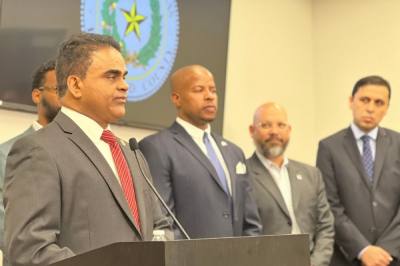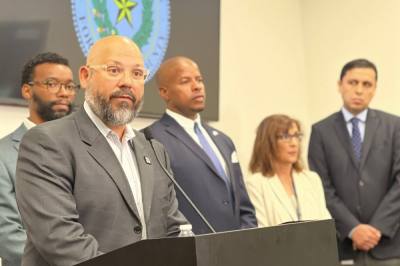The overview
The American Rescue Plan Act funding was allocated towards the housing initiative at a June 13 commissioners court meeting in an unanimous vote.
The resource center, which will be centrally located in Rosenberg along a bus route, is the first phase of a collaborative affordable housing solution in the county, Groff said.
This comes after a February proposal by a group of nonprofits to use $53.45 million in unspent federal relief funds as seed money for a multi-phased housing project to address homelessness in Fort Bend County.
“This day has been a long time coming, but it's just the beginning of new programs,” Groff said. “It's the beginning of a huge collaborative effort to meet needs, and it's going to take all of us continuing to partner together to fill these voids.”
At a June 14 press conference, Groff stood alongside County Judge KP George, Precinct 4 Commissioner Dexter McCoy, state Rep. Ron Reynolds, D-Missouri City, nonprofit leaders and other Fort Bend County officials to discuss the details of this initiative.
Zooming in
Shannan Stavinoha, executive director of Parks Youth Ranch, a nonprofit that provides emergency shelter and counseling to abused and neglected youth, said the $2.5 million will be used to create a bridge-gap service center.
The service center will connect residents at risk of losing their housing with employment assistance, temporary housing, behavioral health care, medical care and other resources needed to sustain housing.
“The idea is to get in front of families who are unstable in housing, [who] are that one paycheck away [from losing their housing],” Stavinoha said. “If we can provide services and support, whether it’s workforce development, medical support or food insecurity—let’s do that. So they don’t have to make the decision between fixing the car or paying the rent.”
McCoy, whose precinct encompasses the central area of the county, said the Rosenberg location of the resource center is where there is the most need.
“Richmond and Rosenberg, right here in Precinct 4, have the highest poverty rate of anywhere in Fort Bend County,” McCoy said. “The poverty rate in Richmond is 22%, and Rosenberg trails behind at about 21%. That's important because this program, this initiative is going to be located right here in the heart of where the need is in our community.”
Diving in deeper
Officials agreed this housing solution will address the root causes of homelessness and empower the community to go beyond temporary housing and move towards long-term sustainability.
Brandon Baca, CEO of Attack Poverty, said its mission is to make sure the poor and marginalized are heard, empowered and whole.
Attack Poverty has locations in North Richmond, Katy, and North Richmond. It collaborates with local organizations, churches and residents to create community programs—such as after school programs; adult GED completion; English as a second language courses; job training; and home repair.
This initiative, Baca said, is an effort to see individuals from a holistic standpoint.
“This is not just a project that we were putting together for tomorrow,” Baca said. “This is a project that we're putting together that will sustain the impact on these individuals.”
Quote of note
At the press conference, Rep. Reynolds acknowledged affordable housing as a critical need in Fort Bend County. He highlighted bipartisan efforts at both the state and local levels to foster a legislative climate where housing solutions like these can be created.
“I challenge you to find any other county that has the collaborative effort—regardless of party affiliation, race, socioeconomic status—Fort Bend County prioritizes people,” Reynolds said. “They put people before politics, and that is what makes it so special.”







